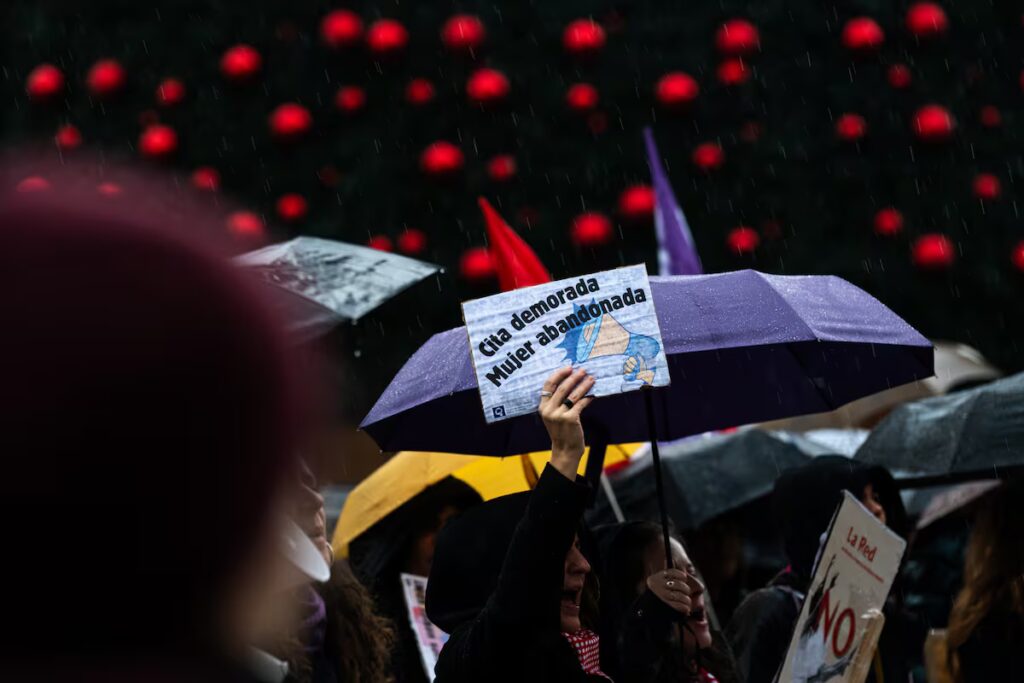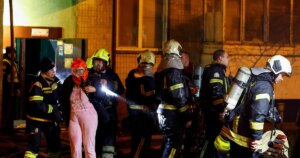
Women unprotected when the system fails and increasingly widespread discourses that deny that violence against them is structural. With these two issues at its core, the feminist movement arrives at 25-N this year. Alpedrete, a citizen of Madrid, was one of the latest examples of this denialist discourse, just a week ago, with the murder of María Pilar. Her husband killed her and then committed suicide. The mayor of the city, from the PP, assured that it was not gender violence, that the man “loved his wife very much” and that what failed was the system by not detecting the psychological illness from which the attacker suffered. Fernández later rectified the matter, but the president of Madrid, Isabel Díaz Ayuso, had already supported the idea that it was not a sexist crime. A month and a half earlier, in September, the failures of the anti-abuse bracelets had been made public, revealing the foundations of one of the most guaranteed protection systems that exist in Spain, because no woman has ever been killed while wearing one of these devices. Issues that accumulate on the World Day for the Eradication of Sexist Violence, to which the feminist movement arrives once again divided. The main capitals march again with two distinct demonstrations.
It’s been happening for three years now. Feminism has been divided above all around trans law – there is a trans-exclusive part, that is, it does not consider trans women as women – and the way of dealing with prostitution – between regulationism and abolitionism – but there are issues on which there is consensus. The first, and obvious, is the need to eradicate all violence as soon as possible. But also in the need and urgency to stem the expansion of the far right and anti-feminist movements.
The Madrid 25N Forum and the Madrid Feminist Movement (MFM), historic organizers of the 25-N demonstration in the capital, focused in their annual declaration on the “denialism of the far right, which opposes the strengthening of specific policies to eradicate sexist violence; on the abandonment and negligence of institutions in the fight against violence against women and on the relaxation of equality policies between women and men”. “The lack of protection against murders is institutional violence and abandonment and negligence put the protection of thousands of women at risk,” the two organizations underline.
And they also recalled the recent and well-known failures of the so-called anti-abuse bracelet system after the change of contractor in 2023 with which the management of that contract passed from the hands of Telefónica and Securitas Direct to Vodafone and Securitas. Last September, the multiple shortcomings that, especially in the last year, have had to face by the Cometa Center, the one that controls these devices, were made public: from the possibility that the attackers removed the bracelet without triggering any alarm, to “geographical inaccuracy”, or some issue which, according to what was written in a report, even “contradicts” the clauses of the award document.
Both the Forum and the MFM call for an “urgent review of the protection policies that become evident in cases such as the disastrous management of electronic bracelets to control sexist attackers” because, they argue, “the lack of protection against femicide is a gross negligence and institutional violence that adds to sexist violence”.
The different parts of the movement have in common this year too that they demand that the systems that Spain has been building for years are as solid as possible, which is why the two main organizations in Madrid, where the pulse of the movement is felt, denounce that there are “cuts” and “relaxations” on the part of the institutions, especially in territories such as the Community chaired by Isabel Díaz Ayuso, where there is a “dismantling of spaces of equality, which is in addition to the recent budget cut intended for the fight for equality recently announced” by the Madrid government.
From the 8M Commission – the platform of neighborhood and city assemblies – they consider “a priority to focus on the increase in patriarchal violence” that exists in society “and more specifically on racist violence”. The statement of this 25-N also underlines “the refusal of the political exploitation of right-wing movements which for years have denied and made invisible sexual and sexist violence, especially that exercised against racialized women”. “Patriarchal violence can never serve to justify incitement to hatred,” they add.
Regarding public policies, they state that “cuts kill” and underline “how violence is a structural issue that is not limited to the private sphere, but also extends to global policies that materialize” in these cuts to public systems “such as those for assistance to victims of sexist and sexual violence”, or healthcare, “essential in the prevention of sexist violence”.
The division that extends from 2022
In 2022, the drafting of trans law has brought to the table a trans-exclusive position from the feminist movement that, until now, had not become visible, or not that much. That position, however, had a background, namely this law and the incorporation of the so-called agenda queer The movement’s initiative was launched by Unidas Podemos, then a partner in the government coalition with the PSOE and with Irene Montero as Minister of Equality.
And this is how the split was reflected, as a separation between the feminism closest to the PSOE, which had historically held the institutional representation of feminism, and that which leaned towards the vision of Podemos. Because what materialized in the free gender self-determination included in the transnational law It was already among the socialist commitments, it had been included in their political and government agenda. There was a political power struggle.
Subsequently, the division continued and increased due to different positions on prostitution – abolitionists and regulators – and the consequences of the Sexual Freedom Act – sentence reductions and releases for those convicted of sex crimes.
Although Montero left office in November 2023 and socialist Ana Redondo has led the ministry since then, and although the political tension over the ministry no longer exists, that crack no longer seems to be closing. There will be two demonstrations in cities such as Seville or Mallorca.
And in Madrid, where the most official heartbeat of the movement is somehow measured, it is particularly visible because it takes place on two routes practically simultaneously and not far from each other. One, the Forum and the Feminist Movement of Madrid, at 6.30 pm, starting from the corner of Gran Vía and Alcalá; and that of the 8M Commission, from Atocha at 7pm.
Historically, the Forum is the organization that organized the demonstration in the capital, it has been doing so since 1997. On the other hand, the platform of neighborhood and city assemblies that are part of the 8M Commission organized actions and marches for this day independently. Until 2023 they had been doing so for four years in a coordinated manner, that is, each assembly met in its neighborhood, but with a common manifesto, motto and manifesto. From that year, 2023, they have joined the Commission’s appeal.
The latter is what trans-inclusive feminism is aimed at, and prostitution regulators too, although there are abolitionist feminists in that march too; and it is also what the former Minister of Equality, Irene Montero, and the general secretary of Podemos, Ione Belarra, have joined in recent years. Part of the trans-exclusivist and abolitionist movements adheres to the Forum and the MFM; That’s what Redondo, having just taken over the Equality portfolio in 2023, joined both that year and last. This 25-N, he declared last Thursday, will go to both.
The 016 telephone line assists victims of sexist violence, their families and those around them 24 hours a day, every day of the year, in 53 different languages. The number is not recorded on the phone bill, but the call must be canceled from the device. You can also contact via email 016-online@igualdad.gob.es and via WhatsApp on 600 000 016. Minors can contact the ANAR Foundation telephone number 900 20 20 10. In case of emergency it is possible to call 112 or the telephone numbers of the State Police (091) and the Civil Guard (062). And if you can’t call you can use the ALERTCOPS application, from which an alert signal is sent to the Police with geolocation.





